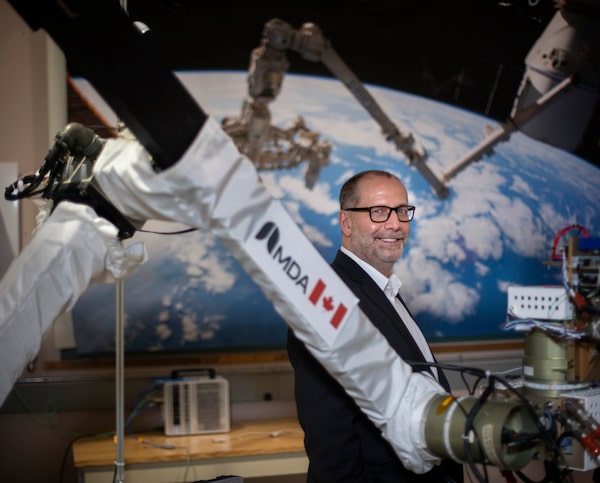
Mike Greenley, CEO of MDA, in the company’s DREAMR lab at the company’s Brampton, Ont., facility, on April 6, 2021.Fred Lum/The Globe and Mail
The chief executive officer of MDA Ltd. says the rapidly expanding global space economy and shrinking cost of launching satellites provide growth opportunities for the maker of the iconic Canadarm, which is expected to start trading on the Toronto Stock Exchange as early as Wednesday.
The Brampton, Ont.-based MDA, once known as MacDonald, Dettwiler and Associates, has cut the size and price of its initial public offering as Canada’s red-hot market for high-growth technology IPOs has cooled. The space equipment company laid out plans in March to raise $500-million and price its shares at $16 to $20 each, but reduced the deal to $400-million and the price to $14 a share.
Chief executive officer Mike Greenley said he’s pleased with the outcome. “Raising $400-million is just what we need to be able to fuel our growth,” he said in an interview. MDA said last week it expects the offering to close on Wednesday.
The company detailed a plan in its IPO prospectus to increase its revenue from $411-million in fiscal 2020 to more than $1.5-billion in fiscal 2025 as it jockeys for position as a key supplier in the space economy.
Mr. Greenley said each of MDA’s three business lines – using satellite imagery to provide geo-intelligence, building robotics for space missions and supplying technology for satellite broadband systems – is poised for growth. MDA, which has a contract to manufacture antennae for Ottawa-based Telesat’s low-Earth orbit satellites, will use the proceeds from its IPO to pay down its debt, which was $424-million as of Dec. 31, and bid on new projects.
The “new space economy,” as Mr. Greenley calls it, is projected to grow from about US$385-billion in 2017 to US$1.5-trillion by 2040, according to statistics from the U.S. Chamber of Commerce cited in MDA’s prospectus. The primary driver, Mr. Greenley said, is rapidly shrinking launch costs. Between 1970 and 2000, launching a payload such as a satellite into a low-Earth orbit cost about US$18,500 a kilogram, he said. Now, because of technological advances, the price is roughly US$3,000 a kilogram – and is expected to fall further.
“As the cost of launch continues to decline, space is increasingly accessible,” Mr. Greenley said.
“As that’s occurring ... our opportunity base is expanding rapidly as well,” he added. “MDA is going through a significant period of growth.”
Last year, Northern Private Capital, which is controlled by John Risley and Andrew Lapham, and whose investors include Jim Balsillie, Senvest Capital and the Fonds de solidarité FTQ, bought MDA from Colorado-based Maxar Technologies Inc.
The company is opting to list only on the TSX (ticker symbol MDA), so it can stress its domestic roots when pitching for Canadian government contracts. Its predecessor was founded in1969 by University of British Columbia professor John MacDonald and physics graduate Vern Dettwiler, before renaming itself Maxar and reincorporating in the United States in a bid to win more U.S. government work.
Heavily indebted Maxar kept MDA as a stand-alone unit, with Canada retaining control of the Radarsat-2 satellite used to monitor the Far North, before selling it to the Risley-Balsillie group last year.
MDA is working on a replacement for the Radarsat-2, and late last year was awarded a $22.8-million contract by the Canadian Space Agency to develop Canadarm3. The AI-based robotic system will serve Lunar Gateway, the U.S.-led space station that will orbit the moon.
Despite the weaker pricing, the investor group that bought MDA in April, 2020, during the depths of last spring’s market correction, is expected to almost triple the value of its investment. The space equipment company expects to post adjusted earnings before interest, taxes, depreciation and amortization of $160-million to $180-million next year, up from $127-million in 2020. It lost $36.2-million in 2020 as it shifted from Maxar’s ownership, after earning $73-million in 2019.
Your time is valuable. Have the Top Business Headlines newsletter conveniently delivered to your inbox in the morning or evening. Sign up today.